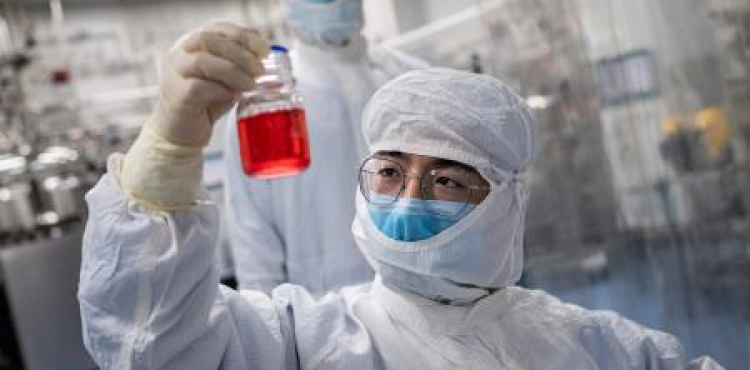In a laboratory in north Beijing, a man in white medical clothing raises a glass tube containing a sample of the first vaccine in the testing phase against the emerging corona virus ... and he may have in his hand the highly anticipated treatment all over the world.
The hopes that Sinofac Biotech, one of the four Chinese certified laboratories, hold clinical trials are high. Even if the vaccine does not prove to be effective, the special group confirms its readiness to produce 100 million doses annually to combat the epidemic that appeared in China at the end of 2019 before it is spread across the world.
The source of the laboratory´s confidence, which in 2009 outperformed its competitors, could be understood to be the first in the world to introduce a swine flu vaccine (H1N1).
And in its huge facilities in Changping in the suburb of the capital, Beijing, laboratory workers are scrutinizing the quality of the experimental vaccine that contains inactive pathogens, thousands of copies of which have been produced. It was placed in a white and red box called "Corona Vaccine".
Even if the treatment is still far from being approved, the laboratory must demonstrate that it is capable of mass production and subject quantities to it to the authorities´ control. From here production began before clinical trials were completed.
And if more than 100 laboratories in the world are competing to find the first vaccine, fewer than 10 laboratories have so far conducted human experiments, according to the Institute of Hygiene and Tropical Medicine in London.
This is the case of the "Cinovac" laboratory, which confirms that it has achieved encouraging results for monkeys, before the vaccine was first tested on 144 volunteers in mid-April in Jiangsu (east).
But the laboratory, founded in 2001, will not reveal the date when the vaccine will be put on the market.
"The question is everyone´s asked," said Liu Beixing, director of "Sinofac Biotech".
According to the World Health Organization, vaccine production may take 12 to 18 months.
"Sinovac", which employs 1,000 people, hopes to reach the end results of product safety, at the end of June, in the framework of the first and second phases of experiments, according to France Press Ming Weinig, director of international affairs.
These experiments aim to verify that the vaccine does not pose a danger to humans. To be sure of its effectiveness, a third stage experiment must be performed in people who carry the virus.
Ming said there is a problem "because only a few cases are recorded in China every day." In the event that a second wave of infections is not recorded on Chinese soil, the group will have to test the vaccine for people with Covid-19 abroad.
"We are currently in contact with several countries in Europe and Asia," he said.
"A third stage test usually includes thousands of people. It is not easy to get this number in any country."
The group has built south Beijing a production site capable of securing 100 million doses of vaccine, which will become operational before the end of the year.
"We work day and night, and it means that we are not wasting time at all," Ming said.
A possible vaccine produced by the "Senovac" group will not be enough to protect the Earth´s inhabitants. Ming stressed that his group is ready to "cooperate" with foreign partners who are now selling vaccines against influenza and hepatitis.
China will take revenge if it becomes the first country to provide a vaccine against the Covid-19 epidemic, after it was discovered that the epicenter of the emerging corona virus was the Chinese city of Wuhan.
"We have a lot of support from the Chinese government," Ming said. "We don´t get much money," rather we get cooperation from public institutions that supply Sinovac with viral strains.
Besides Sinovac, Beijing agreed to a clinical trial of three other test vaccines: the Military School of Medical Sciences and the Kansino Biotechnology Group launched one, the Biological Products Institute and the Wuhan Institute of Virology, a second experiment and the China Biotex Group, conducted a third trial and Tuesday tested 32 volunteers.












